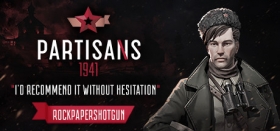
Partisans 1941 Review
Despite stealing the same dull colour palette Obsidian used for Fallout: New Vegas, Partisans 1941 is a game that offers a whole lot more than you could get from any screenshot or trailer. Taking place during the Second World War, from the perspective of Soviet Russia. Resisting German forces, you are tasked with rounding up partisans to buy more time for the soldiers defending Leningrad.
Heavily influenced by the Commandos series, Partisans 1941 not only pays a fantastic homage, it far surpasses that series’ peak. During missions, you’re left in charge of a small squad to boss around and get things done with. Everything happens in real time but there is an option to head into the ‘tactical’ view, which slows the action down if you’re a bit unsure of your next steps.

Similar to the Commandos games, you’ll find yourself saving and reloading a lot on Partisans 1941. Not every idea you have can be executed on the first, or even second try and a failing plan is usually followed by disaster shortly after. Throughout the game, I generally found having one character run around with a knife and using the others as mules to carry items was the best approach. You won’t find much, if any, success in taking on enemy patrols head on. Remaining hidden, slowly picking off sections at a time is the most efficient way of doing things. Failure doesn’t feel too punishing however, meaning the game never feels unfair. Any failed attack I had would have me leaning back in my chair, pondering what I could do differently. I never felt I had the upper hand and the game snatched that away from me.
Naturally, the game comes with a much more unforgiving hard mode. You’re caught easier, you’re killed easier and there’s no quick save/quick load option. It’s a much more brutal experience when compared to the experience on other difficulty settings. The skill tree does help alleviate some of that pain, thankfully. As you advance through the game and improve the characters you have access to, you really begin to feel them develop. In turn, this allows you to take bigger risks when approaching combat situations. That sense of improvement always encourages you to push on.

Those improvements are also symbolised in the missions the partisans take on. As the group slowly expands and more soldiers arrive, their scope when taking down the German occupation becomes increasingly ambitious. By the game’s end, you’re pulling off some incredible, yet logical heists. There’s a clear path from the game's hopeless beginning to becoming a truly fearless rebellion by the end. Missions throughout the game aren’t getting bigger because game logic defines that, that needs to happen, they get bigger because the characters become more confident in handling the tasks. It’s a brilliant progression that does a great job of never seeming out of place in a game deep rooted in reality.
At the end of every mission, the partisans return to their home camp. Here, the player can do a bit of micro-management, ordering their party to collect food or perform tasks for a small reward. In the early portion of the game, it was an enjoyable bit of downtime, allowing for bits of conversation between characters and giving an actual feeling a rebellion may be brewing. Yet, the further in you go, the more barebones the camp system reveals itself to be. There was a lot of potential, but it ends up feeling tacked on to give the game some extra length.

Partisans 1941 really ties everything together with its setting. When I first began, I thought the derelict world was dreary and dull. Yet as time moved on, I realised this was the reality of war-torn Russia during the Second World War. Partisans 1941 is a beautiful recreation of one the ugliest times in humanity’s history. It’s a distinct artistic design, likely not for everyone, but focusing on brutality rather than beauty helps push both character and narrative to the next level.
The narrative is something basic, but benefits from the setting. For the most part, it focuses on a group of Russian partisans, as their fading hope begins to shine brighter the more you progress through the game's story. Rather than dangling plot twists in front of the player, the game focuses on that hope, in a time where hope seemed a distant past. The Russian voice acting adds a lot of emotion to the character interaction too, although the English voice tends to fall short of the mark. I’m unsure why they’ve elected to go down the “make everyone cockney route”, but it’s a route that leaves a lot to be desired.
Ultimately, Partisans 1941 is a fantastic refinement of the old Commandos games. Despite a basic narrative, the aesthetic, voice acting and setting will keep the player keen to carry on through to the story's conclusion. The base building mechanic tends to get in the way of an otherwise impressive game, but it certainly doesn’t ruin the experience by any means.
Partisans 1941 (Reviewed on Windows)
This game is good, with a few negatives.
A satisfying take on the Commandos genre. Partisans 1941 allows players to walk through the brutality of the Second World War, searching for a beacon of hope on the other side.








COMMENTS